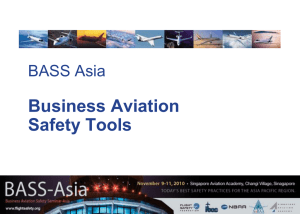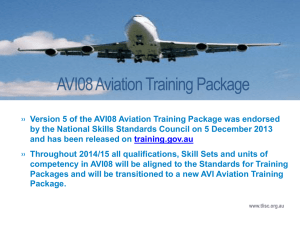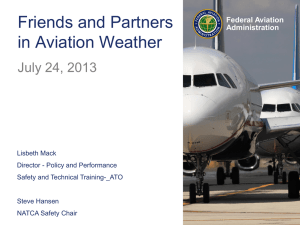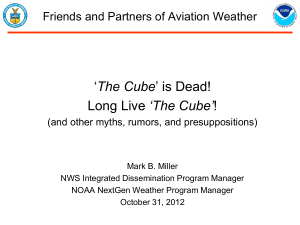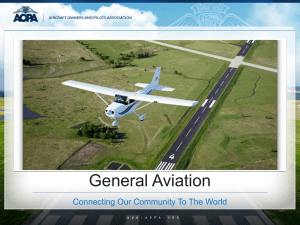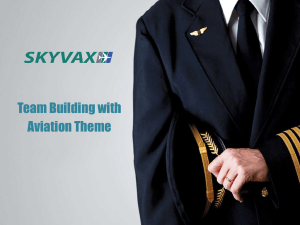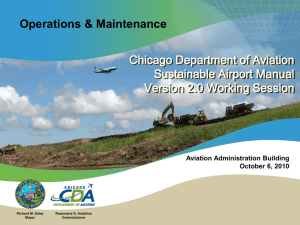Gary Pokodner
advertisement
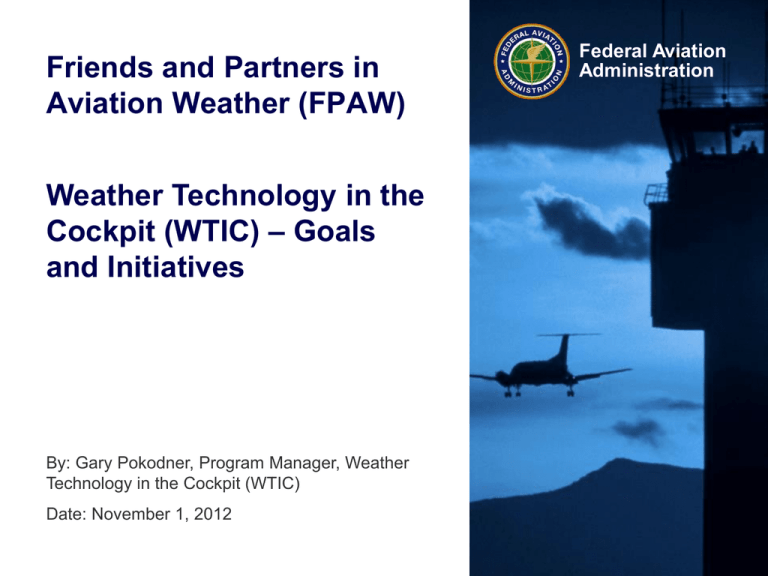
Friends and Partners in Aviation Weather (FPAW) Weather Technology in the Cockpit (WTIC) – Goals and Initiatives By: Gary Pokodner, Program Manager, Weather Technology in the Cockpit (WTIC) Date: November 1, 2012 Federal Aviation Administration The Notional WTIC Cockpit? Federal Aviation Administration All Kidding Aside: • The previous slide highlights important issues with our WTIC program: – More information is not always better; need the right information – Poor human factors can reduce benefits of enhancements – Complex to get information and data to cockpits – Training matters • Despite our dream notional cockpit, the WTIC program is not building boxes Federal Aviation Administration 3 Weather Technology in the Cockpit (WTIC) Overview • WTIC is an FAA NextGen program that consists of a portfolio of research projects • WTIC research is used to develop, verify, and validate requirements for standards related to weather information and technology in the cockpit • Research to identify requirements that improve the quality and quantity of meteorological (MET) information in the cockpit • The program supports multiple NextGen goals • Reduce weather delays • Re-route flexibility to avoid adverse weather • Reduce weather-related accidents and incidents Federal Aviation Administration 4 WTIC Goals Flight Deck/Cockpit Information • Appropriate and optimized weather information to support NextGen and current operations is available in the cockpit – Released standards/guidance documents to enable implementation of mobile meteorology (MET) applications concurrent with supporting technology – Capabilities and requirements to enable automated turbulence information identified – Capabilities and requirements for improved oceanic information defined – Phased improvements of pilot awareness of adverse weather (alerts, data comm, pre takeoff) – Completed benefits assessment of probabilistic information into the cockpit Federal Aviation Administration 5 WTIC Goals Human Factors • Pilot interfaces to cockpit weather information enable consistent, safe, and efficient execution of all NextGen and current operations – Developed recommendations on optimal presentation of GA MET information – Improved GA training methodology on the use and application of MET information in the NextGen environment – Developed recommendations on cockpit applications of Weather Avoidance Fields (WAFs) – Implemented corrective actions to trends identified in weather related accidents/incidents reports Federal Aviation Administration 6 WTIC Goals Standards • Recommended standards are ready for implementation of weather in the cockpit to support all NextGen and current operations – Defined datalink architecture for disseminating MET information to/from the cockpit (via RTCA support) – Minimum Aviation System Performance (MASP) for downlink, uplink, and crosslink of MET information (via RTCA support) completed – Initiated Minimum Operational Performance Standard (MOPS) (via RTCA) – Initiated globalization of select standards Federal Aviation Administration 7 WTIC Goals Air/Ground Integration • Dissemination of appropriate and optimized weather information to/from the cockpit to be at the right place and at the right time – Released recommended standards for EDR – Demonstrated benefits of enhanced wind information uplinked to aircraft FMS for select NextGen applications – Developed functional and operational requirements for disseminating MET information via NextGen datalink architecture – Identified the feasibility and benefits for providing 20 minute and beyond weather look ahead in the cockpit on a legacy or portable device – NextGen datalink architecture supports optimized presentation formats Federal Aviation Administration 8 WTIC Goals Technology • Industry collaboration on MET technology research to be informed of technology capabilities that enable efficient MET information dissemination, collaborative decision making, and intuitive presentation of MET information in the cockpit for safe current and NextGen operations Federal Aviation Administration 9 Building WTIC Program Support • WTIC Team is actively engaging stakeholders (internal and external) to better define user needs – Improved collaboration with internal FAA agencies including: Safety, Certification, Human Factors, … • We are always looking for your suggestions, feedback, and new research ideas Federal Aviation Administration 10 WTIC Team – Key Personnel • Office of Primary Interest: Aviation Weather Division (ANG-C6) – Acting Division Manager: Rick Heuwinkel • Office of Primary Responsibility (OPR): Weather Research Branch (ANG-C61) • • • • Steve Abelman, AWR Team Lead (202-385-7234) Gary Pokodner, WTIC Program Manager (202-385-7236) Eldridge Frazier, WTIC Lead Engineer (202-385-7183) Ian Johnson, WTIC Engineering Psychologist (202-385-7168) Federal Aviation Administration 11
